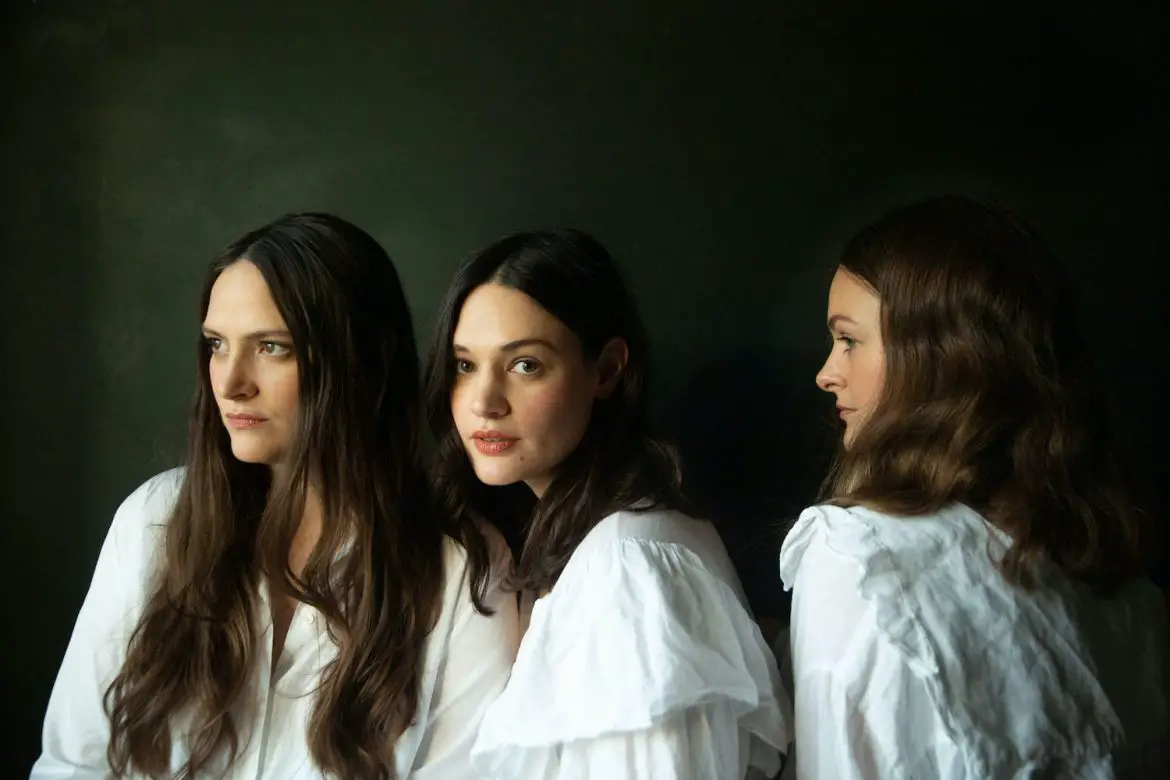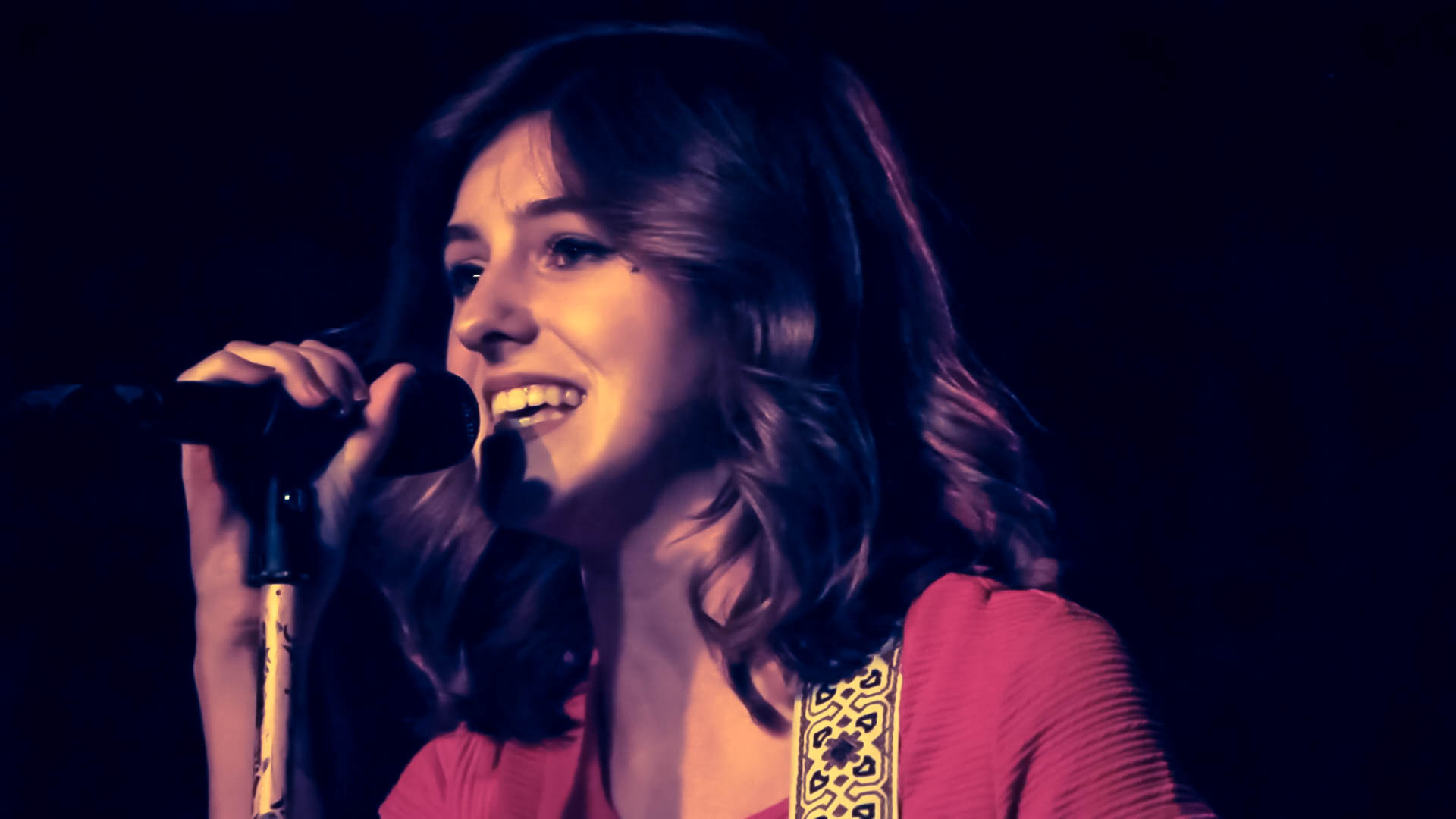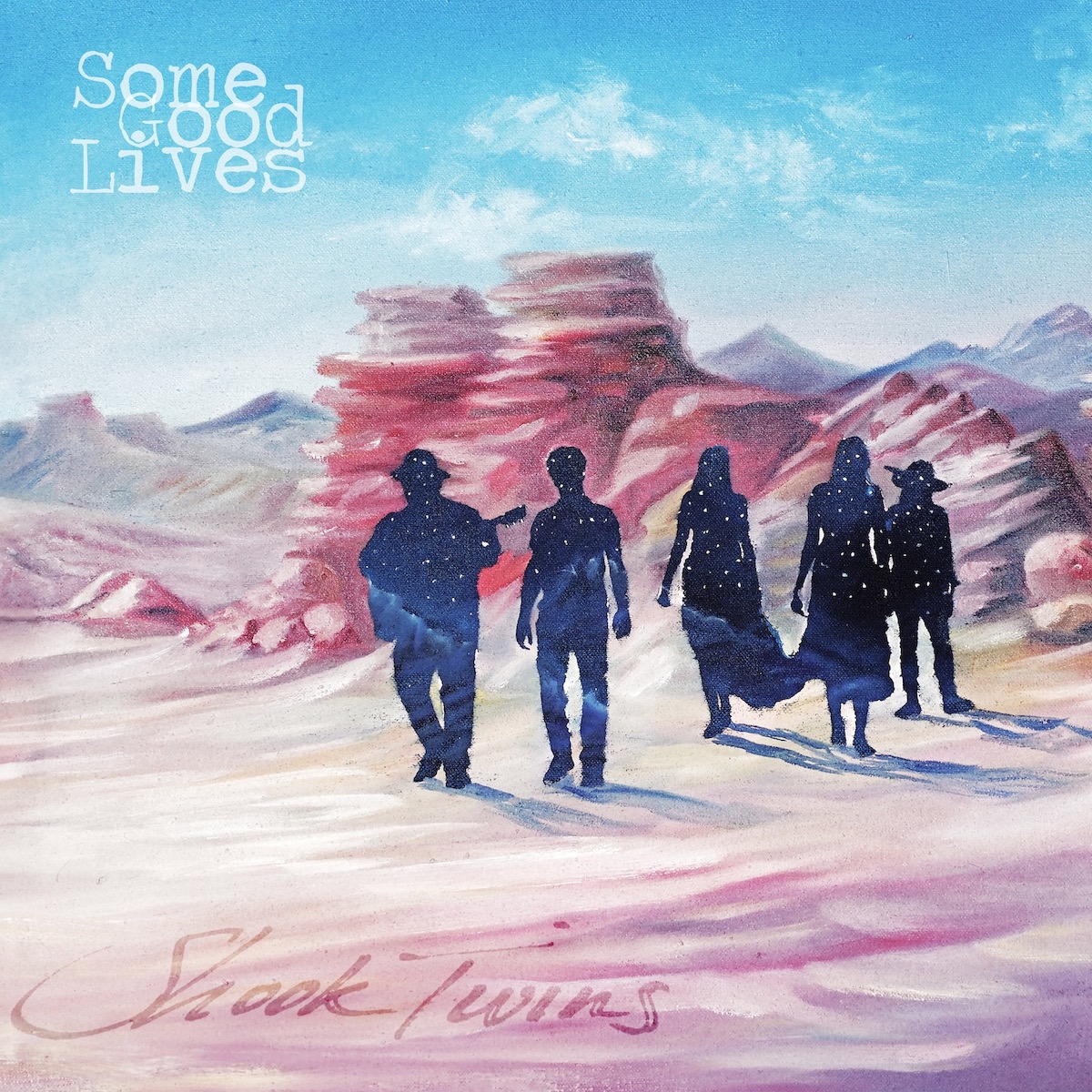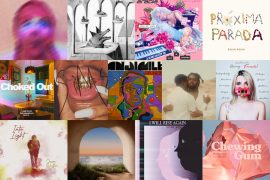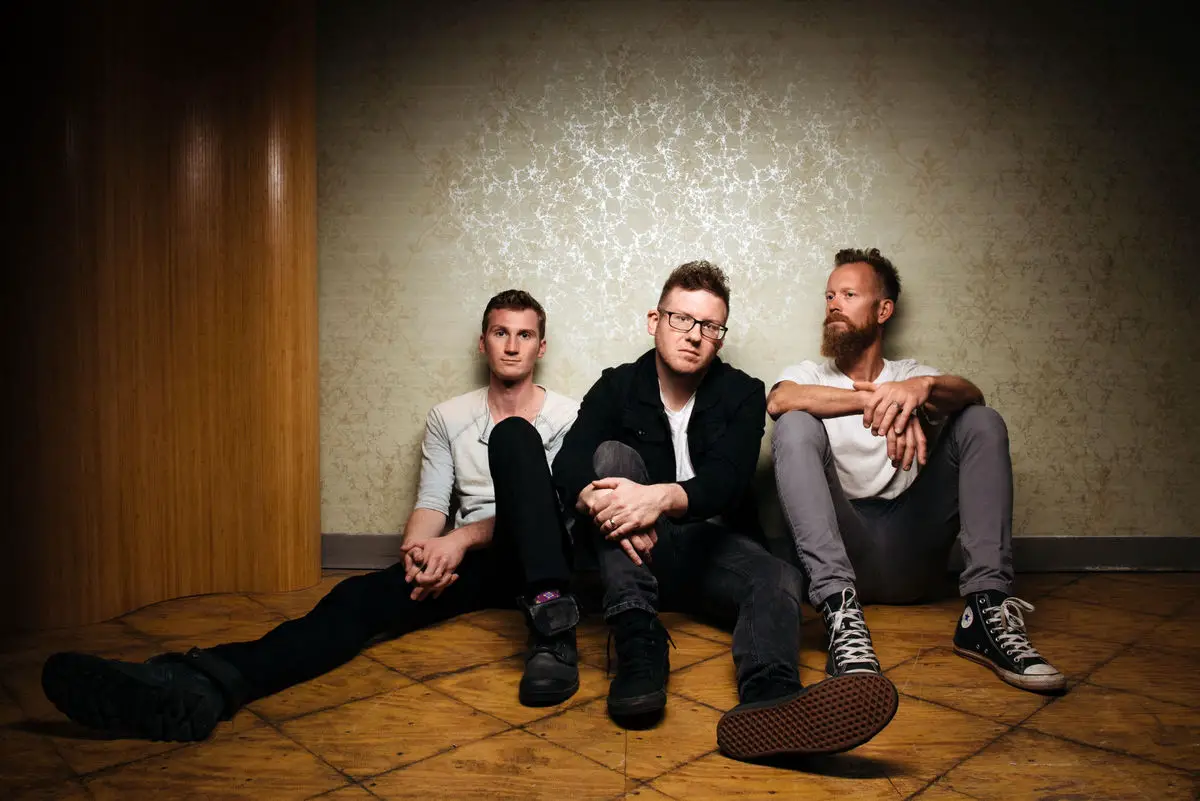An ambitious record full of soaring sounds, sweeping melodies, and deep personal reckonings, The Staves’ long-awaited third album ‘Good Woman’ is a breathtaking and beautiful masterpiece.
Stream: “Good Woman” – The Staves
An ambitious record full of soaring sounds, sweeping melodies, and deep personal reckonings, The Staves’ long-awaited third album is a breathtaking and beautiful masterpiece.
As resounding a return as it is a definitive statement in its own right, Good Woman redefines The Staves’ art while staying true to their core identity. The band’s third full length album – their first LP in six years – reintroduces the Staveley-Taylor sisters as a stunning musical force to be reckoned with: A group dedicated to improving and expanding upon their craft, overcoming personal and professional obstacles, and injecting substance, depth, and meaning into their songs, however delicate or strong they may be.
The Staves have reached the precipice of greatness as they begin a new chapter of their journey together.
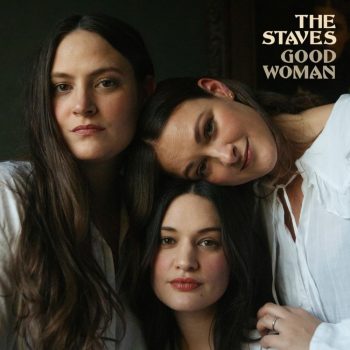
Well, you say what you want
And you never go back
And this song is a song
Even buried in the black
Well, I cover my mouth
And I straighten my back
Well, I cover my mouth
And I straighten my back
I’m a good woman…
Be kind
I’m a good woman
Released February 5, 2021 via Atlantic Records UK / Nonesuch Records US, Good Woman arrives six long years after The Staves’ sophomore LP, the universally acclaimed If I Was. Though they have been anything but silent in the intervening years – the trio teamed up with contemporary classical group yMusic to release a 2017 album The Way Is Read, and released a slew of EPs and singles, including the new holiday classic “Home Alone, Too,” 2016’s effervescent Sleeping in a Car EP, and 2018’s intimate Pine Hollow live EP – Good Woman nevertheless feels like a return several years in the making.

“I guess it feels like we’ve been working on this album for a very long time and not able to fully do that much else in that time,” The Staves’ Camilla Staveley-Taylor reflects. Together, Camilla and her sisters Jessica and Emily formally founded The Staves in the late aughts in their hometown of Watford, England. The sisters quickly garnered praise for their sweet vocal harmonies and resonant folk sound; their initial EPs Mexico and The Motherlode were followed by 2012’s Dead & Born & Grown EP, alongside numerous international tours and positive reviews. They worked with Bon Iver’s Justin Vernon on 2014’s sophomore album If I Was, whose deluxe edition cover song of Bruce Springsteen’s “I’m on Fire” has garnered over 23 million streams on Spotify alone.
Several tours and EPs later, the trio began working on a third and self-produced album in early 2017. “We were kind of writing and trying out sonic things, and were kind of getting cracking, and then in 2018, we very suddenly lost our mother, which naturally just kind of ground everything to a halt because… Well, it just did,” Camilla explains. “And from that point, we tried to carry on for a little bit… Because I think there’s a kind of idea of, one; What else are we gonna do? Just kind of sit in this. But, two; A vague idea of like, “Oh, she would have wanted us to carry on and she’d want us to do the thing that we love.” But it was just too much too soon, and our brains just weren’t working in that way, so we kind of had to really step out of music-making for a while, and it ended up being about a year and a half before we could properly delve back into it, back into trying to complete this body of work.”
Good Woman transcends two worlds: Some of its songs date back to 2017, and concern themes like trust, self-doubt, vulnerability, and emotional strain. Camilla wrote tracks like the raw “Paralysed” and tender “Devotion” while with her then-boyfriend in the States. “I was still in a relationship, which is horrible now looking back on it and seeing the lyrics and just thinking, ‘Oh, my God. You should have got out of that way before’.”
Atwood Magazine recently hailed “Devotion” as “a soulful and intimate surrender stacked with smoldering harmonies, driving beats, and soaring, seductive melodies.”
Elsewhere, Good Woman‘s songs deal with more recent events: “Sparks” is a celestial, heartbreakingly poignant and loving tribute to the sisters’ late mother.
“That’s the only one really,” Jessica says, explaining that while so much Good Woman‘s “story” seems to revolve around their mother, most of its songs are not centered around her or their grief.
“I mean, it’s obviously a part of our identity now, and I don’t even mean as a band, but as a person, it shapes your identity when something like that happens… it kinda just captures what was a kind of dream-like period of time, and I don’t mean that in the sort of the blissful sense of it, of a dream, like, the experience, but a feeling of nothing quite feeling real… Those sort of thoughts that whirl around in your head when you go to bed, it’s something like that, I think in that song.”
Say you will be my little light in the dark
When I want to see you for a night owl
Guess I don’t do too bad, you’re my only one
And I’m laid out, I can hear your keys in the door
I wanna believe it, kitchen wishes
I really wanna be fine, so let me down easy
Is it over, is it real
Did it hurt, did you feel
I don’t talk, I can’t sing
Any line, anything
All the love you have hidden in the dark
Waiting for a moment, waiting for a spark
Higher love I’ll love you now
In a higher love I’ll love you now
– “Sparks,” The Staves
Though they had originally set out to self-produce this record, The Staves ultimately brought in celebrated producer John Congleton (Phoebe Bridgers, St. Vincent, Angel Olsen) to help them bring their vision to life and get their music to the finish line. The resulting twelve songs inhabit a space that is at once ethereal and grounded, light and dark, bittersweet and sweet: It’s music for good times and bad, songs of loss and discord, love and learning, nostalgia and reflection – and lots of in-between.
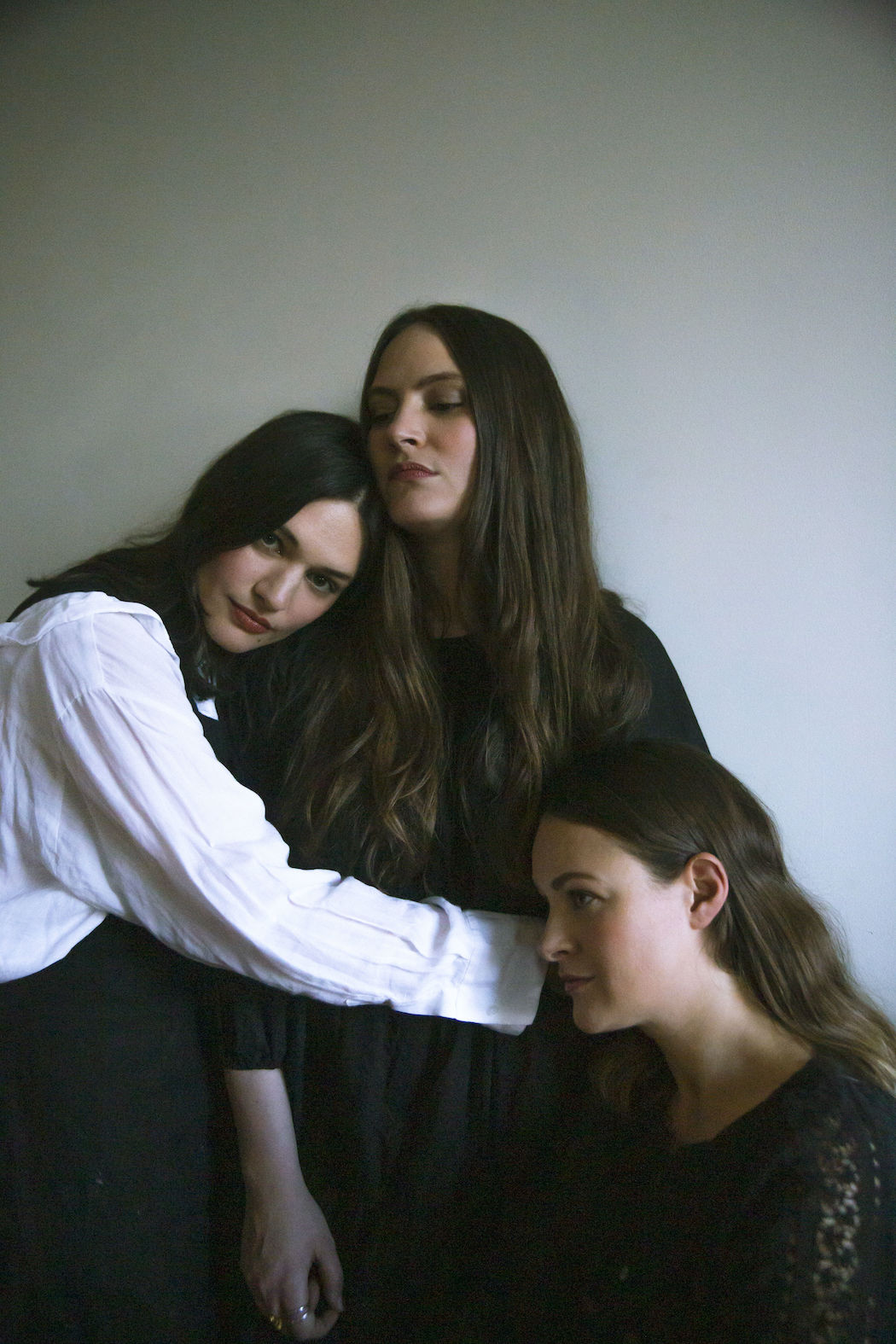
A new kind of coming-of-age, Good Woman is a sweeping soundtrack of upheaval, reflection, and self-discovery.
Camilla calls it an album of “finding.” A lot can change over the course of just a few years, and The Staves embrace their own transformations in real time throughout an album that breathes with spirituality and grace – not to mention pure, unadulterated energy. Good Woman‘s opening tracks “Good Woman,” “Best Friend,” and “Careful, Kid” – three of Camilla and Jessica’s favorite songs on the entire album – make for an emphatic and visceral introduction. The Staves set the bar high as they tap into explosive, overdriven guitars and big drums alongside their signature soaring harmonies and gorgeous melodies. The record opener, lead single, and title track “Good Woman,” an Atwood Editor’s Pick, has been previously described as “an impassioned, soul-stirring homecoming, mantra, and declaration” that puts The Staves’ full weight on display. A wash of stunning harmony falls gently on the ears as the band weave together a dazzling, intimate outpouring of mores and personal values, taking ownership of their womanhood while paying tribute to such qualities as sisterhood and motherhood.
Surrender is sweet
Forgiveness divine
But who will build statues of me
When I leave you all behind?
But I’m carrying weight
But I know it’s not mine
With half a heart it’s hard to stop
But I feel as though
I’m a good woman…
A buoyant song constantly moving forward, “Best Friend” is one of the few truly uplifting songs on the album. The trio’s voices cascade upwards with dazzling bright unison as they revel in the seemingly eternal, endless possibilities of youth. “It’s really nostalgic, and it’s 100% about my youth, and my best friends growing up and my home town and my high school,” Jessica says. “I think it’s that feeling of the rush of excitement of being young and how you’re so desperate to kind of grow up and get on with your life and be the sort of realized version of yourself, and you’re sort of hurtling towards this future, and it’s only when you get a bit older, that you look back and you think, ‘Why was I rushing? I was having a great time.‘ It’s that sort of heightened sense of emotion and drama that you get at that age.”
And then there’s “Careful, Kid,” the dynamic overhaul an early Staves fan might never see coming. Crunchy guitars and hard pulsing drums – the kind that might fit a good Led Zeppelin song – feel impressively at home alongside the band’s hot-on-the-mic vocals. It’s a dramatic, seismic outpouring: One that washes over the senses in the lead up to a heavy release of tension. It’s a new kind of Staves song.
“Harmonies are always really important to us to be heard and not to be drowned out, but it’s also pretty firmly established on any album of ours that we sing in harmony, so it’s okay to kind of allow that to take a back seat sometimes when there’s something that feels like it’s important to be heard instead,” Jessica says. “It was really cool to be able to rock out on those songs, and ‘Careful, Kid’ in particular, I remember in the studio, we had a demo going that had no drums on it, it was just kind of the structure of the song and with the crunchy riff that goes on throughout, and guitars and synths and it was really cool… We were like, it just needs drums – we need to see how that works. I remember in the studio when we were recording with John, they just sounded so epic and so good, and he’s so great at getting amazing drum sounds and being really experimental with the way he records, and it was just like, ‘This is better than I ever dreamed it would be.’ It’s really big. It’s fucking huge.”
While these three set a high standard, they are just the tip of the iceberg – an exciting entrance into The Staves’ wondrous new world. The Staveley-Taylor sisters have always known how to enchant, but never before has their tapestry of sound felt this powerful, emotional, and purely evocative. Good Woman is a truly breathtaking triumph of sound and substance: One that reminds us why we’ve long loved The Staves, and why we will continue to follow their career in the many years to come. If this meets their potential today, then their future is truly limitless.
If you know then you know
Well I never really know
And you’re coming in strong
But you waited too long
All the kicks in the ribs
They can really make you weak
And I’m coming back round
From a five year rebound
Would you give me one side to go on
So you cut your teeth before I did
No one cares be careful, kid
Be careful, kid. You’re just a kid
Be careful, kid.
If you’re running in the road
then you’re gonna get HIT
– “Careful, Kid,” The Staves
For the trio, Good Woman is as much a fresh, new beginning as it is the end to a dark and difficult chapter in the sisters’ lives. “It feels very, very momentous now to have it finished and to be putting it out after so long, and after so much has happened, break ups, death, birth,” Camilla says. “It feels very, very cathartic to literally let it out there, throw it out there, and kind of close a chapter. It feels… It feels big for us.”
Listening to Good Woman, it’s easy to understand how this album might be as special for the listener as it is for those who wrote and recorded it. Capturing a time of tumult and turbulence, loss and grief, growth and perseverance in song, Good Woman transcends the moment: It is bigger than me or you, now or then. It speaks to love; loss; birth; death; home; togetherness; womanhood; sisterhood; connection; and more.
Jessica and Camilla dove deep into Good Woman‘s weeds with Atwood Magazine, exploring its songs and sounds, nooks and crannies. Listen to one of 2021’s best albums of the year now, and reconnect with The Staves in our interview below!
Good Woman is out now.
Especially as we’ve been a bit more upfront and frank with these lyrics, I hope that [Good Woman] empowers people and I hope that it brings comfort to people.
— —
Stream: ‘Good Woman’ – The Staves
A CONVERSATION WITH THE STAVES

Atwood Magazine: Happy New Year to all of you. Before we talk music, I just want to check in – how have you and your family been doing throughout this pandemic?
Camilla: It’s so difficult to answer, isn’t it? It’s been okay. I’m kind of reticent to moan too much because I have a place to live that I like, I’m not struggling that way, I don’t have any kids, so I’m not having to deal with any of that sort of shit, but it’s been very strange feeling quite purposeless. Just kind of rattling around. And it’s been interesting, me and Em and Jess, actually, were talking about this idea of having to be productive and feeling guilty if you haven’t had a productive day and putting such a value on that… And it’s like, actually it’s okay. You can cut yourself a little bit of slack, it’s a fucking weird time, and it’s okay to not have achieved something at the end of every day. Yeah, so I think it’s been kind of important to take it day by day, ’cause I find that if I think too far down the line at how long this weird life could stretch out in this way, it’s quite panic-inducing. So I’m like just dealing with this step.
I take things like doing the laundry as a plus like I'll do it on a Wednesday, so I don't have to do it on the weekend, and for me, it's a win.
Camilla: Yeah, I brushed my teeth today. So it was great.
I'm glad to hear that everyone's been doing well. I assume that the three of you were not quarantining together for the longest period of time. Now that you started to play more, have you been seeing your sisters a little more often now that we're in the lead up to this release?
Camilla: Yeah, yeah, we’ve been seeing each other and kind of… ‘Cause over here, we’ve been kinda going in and out of lockdown for a while, so there’s been some periods where we’ve been able to actually be together, and then at the moment, we are kind of picking the points when we can be together, ’cause obviously we have to for work, but doing as much remotely as we can, but yeah, I have been able to see them a bit and Emily trying to kind of juggle being a parent with being a bandmate. So child care is a thing apparently, you can’t just leave them to their own devices. She’s a real ray of sunshine. Yeah, we’re mildly obsessed with our niece. She’s very, very cute. Very strong-willed.
That's wonderful. The Staves might have a fourth bandmate in good time, who knows.
Camilla: Yeah, exactly. We just got to train her and force her into it, it’d be great.
We actually spoke about four years ago at Music Hall of Williamsburg in Brooklyn. At the time, we talked a lot about If I Was, musical experimentation, using the voice as an instrument and a lot more topics about the changing tides that were The Staves of the time. This is a bit of an existential question, but are The Staves more or less the same band I met then, or do you feel you significantly changed in the past four years?
Camilla: Yeah, I think we have changed a lot. I think that one, the world has been through quite a lot in that particular time frame, and we’ve been through a lot as well in our personal lives and as a band, I think that… When we moved over to America, that was in 2016. And yeah, it’s been weird kind of going back over this time, but when we moved over there shortly after Brexit happened, and then later on that year all the… Well, Tangerine got elected. And I think you have to work quite hard to not be changed by being around at a time of such tangible tension in the air that kind of forces you to question quite a lot about the life you’ve been living. And what you stand for and how you communicate with other people. Oh, Jess is here.
Jessica: I think there’s not really any way that we could be the same band that we were. So much has happened to us as people, as a family, but as a band as well. I think we’ve grown a lot as a group, I think we’ve kind of reached a sort of… More of an understanding of how we work together, and more confidence, I think as musicians and as a band and… Yeah. In our own sense of probably judgment of things and… Yeah. I think we’re a stronger group than we were actually.
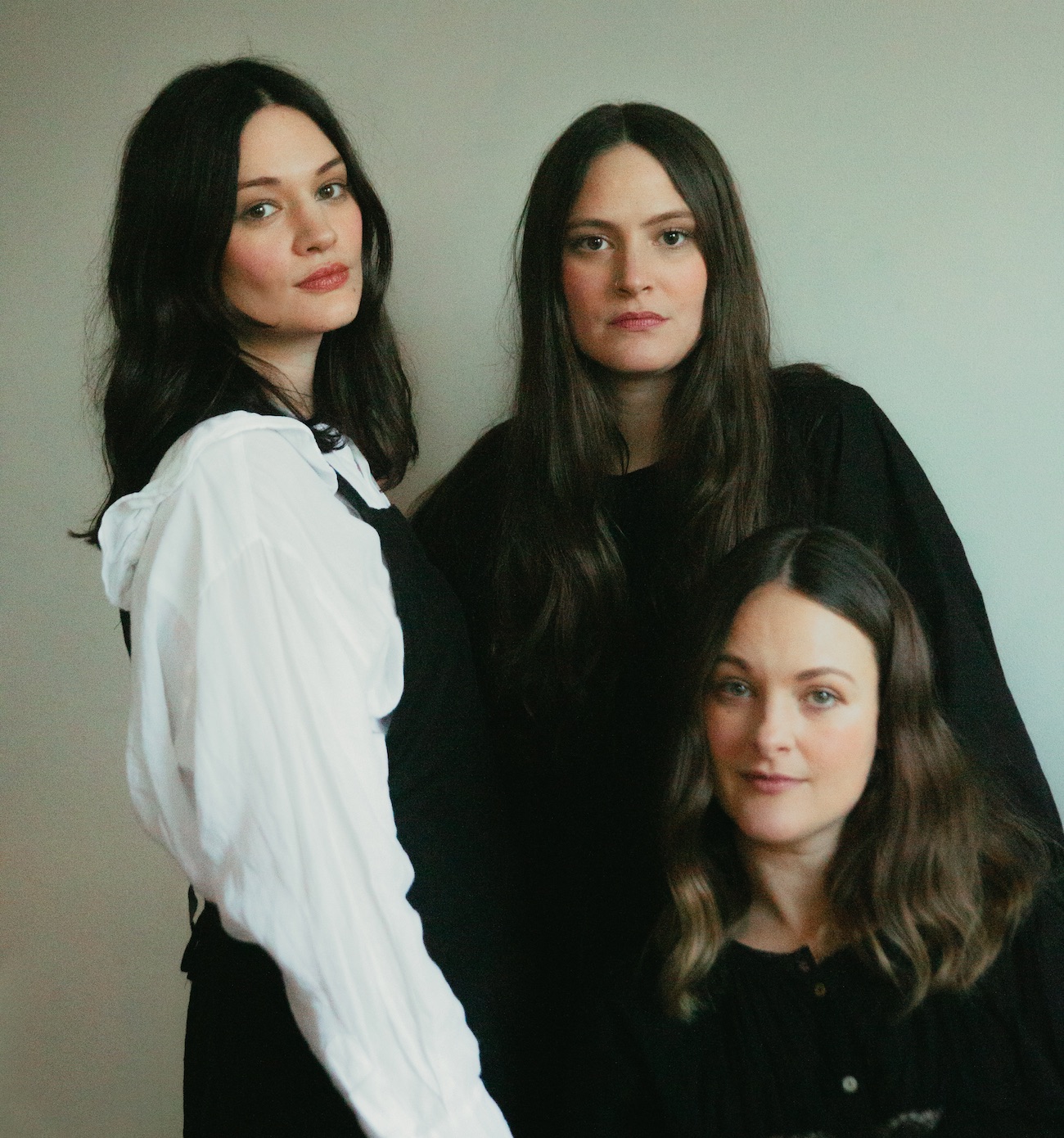
I appreciate both of your time and please send my best to Emily as well. Despite the length of time and the fact that we're turning The Way Is Read from an album into an EP, you haven't been absent these recent years. Your tracks “Home Alone, Too” and “White Roses” with Flyte are two of my favorite songs from the past couple of years. Camilla, you also had a feature on Bon Iver's, i, i and you have a new song with Night Flight, “Canada” coming out later in the year.
Camilla: Thank you! Yeah. Yeah. I sang on that song, which is really, really nice.
I know you were saying earlier, it feels like a return in many ways, but it's not like you haven't been around… Does it really feel like this is the return for you though?
Camilla: I think it does. I mean, it’s not like we’ve been completely, as you said, completely dormant since If I Was. We have been doing things and made The Way Is Read and various EPs and singles and things like that. But I think it feels like… I guess it feels like we’ve been working on this album for a very long time and not able to fully do that much else in that time. We started demoing in 2017.
We were kind of writing and trying out sonic things, and were kind of getting cracking, and then in 2018, we very suddenly lost our mother, which naturally just kind of ground everything to a halt because… Well, it just did. And from that point, we tried to carry on for a little bit, we tried to carry on demoing. Because I think there’s a kind of idea of, one; What else are we gonna do? Just kind of sit in this. But, two; A vague idea of like, “Oh, she would have wanted us to carry on and she’d want us to do the thing that we love.” But it was just too much too soon, and our brains just weren’t working in that way, so we kind of had to really step out of music-making for a while, and it ended up being about a year and a half before we could properly delve back into it, back into trying to complete this body of work.
And… Yeah. So now that it’s kind of finished, and post coming out of that hibernation, we wrote some more songs and kind of completed the body of work. It’s weird now, some of them are kind of… Everything is now pre or post that period of time. And we have a good amount of songs from both of those periods. But yeah. It feels very, very momentous now to have it finished and to be putting it out after so long, and after so much has happened, break ups, death, birth. It feels very, very cathartic to literally let it out there, throw it out there, and kind of close a chapter. It feels… Yeah. It feels big for us.
I see, it's... It means a lot, because a lot went into it and big topics inspired it.
Camilla: Yeah. Definitely.
I lost my mother in 2017 as well.
Camilla: Aw, I’m sorry.
Thank you, and I'm sorry for your loss too. It wasn't quite as sudden, but it was a shock to our family and continues to this day and I've made a lot of music in her honor since then and I hadn't known grief before then, but I found it to be as strong, if not an even stronger influence than love. Anyways, was that an experience that you had as well in terms of being propelled to write from that place?
Jessica: Yeah, probably. Yeah, I think that initially, I definitely didn’t even wanna listen to music when it happened. Everything felt like it reminded me of her or of my old life or something, it was like… It was really difficult. And I remember I didn’t sing for a really long time, which is something that I would do every day. Just around the house.
Camilla: Yeah. Same.
Jessica: Yeah. It felt like I just wasn’t compelled to do that at all. I suppose it literally kind of in mourning in every way. And then I think, eventually, gradually it sort of came back and I felt inclined to sing and to pick up the guitar and to even write a song, but I don’t think it was… It was still too close and too near to really write about, so actually, it’s not really featured on the record. And as Milly was saying earlier, we’d written a lot of it, or most of it before that massive event happened. So it’s not a record about us losing our mom and about that thing. I think that record may come or maybe it’s just gonna kind of exist in everything we do anyway, as it sort of naturally will. There is a song on the album called “Sparks” which is about that, and that’s the only one really. I mean, it’s obviously a part of our identity now, and I don’t even mean as a band, but as a person, it shapes your identity when something like that happens.
And you carry it with you. So there are songs that were written after the... Like you were saying, the before and the after, that I feel maybe they wouldn't have been written if it hadn't been for that, but they're not directly about it if that makes sense.
Camilla: I think it’s less of a… In subject matter, it’s not that present in the album, but I think that had we not gone through that, I don’t think that… I don’t think the album would have had the same energy, because we’ve been talking about it and kind of musing upon it for a little bit, and there’s… We found that after mom died, going through something that big, and that kind of earth-shaking, although it’s horrendous, it also gives you a crazy amount of strength and fearlessness, so I kind of felt like the worst has happened now. Like, I couldn’t have imagined that this would happen and it’s happened, and I’m still here and I’m still alive, and I’m still getting up every day.
And I think that it just put a lot of things in perspective about life and about things that bothered me, things that worried me before, or hang-ups that I had or things that I felt scared of just suddenly seemed so stupid and so insignificant next to this huge seismic thing that had happened. And so I think that an offshoot of that was that we just had a real fuck-it vibe about this album, of just like, let’s just do it and not think about every tiny little thing and try and be precious about it, just do it. Be bold, life is very short or can be very short, and there’s no time to waste time and mess around, just kind of go for it. And I think that we wouldn’t have been able to have that attitude quite as much had that not happened.
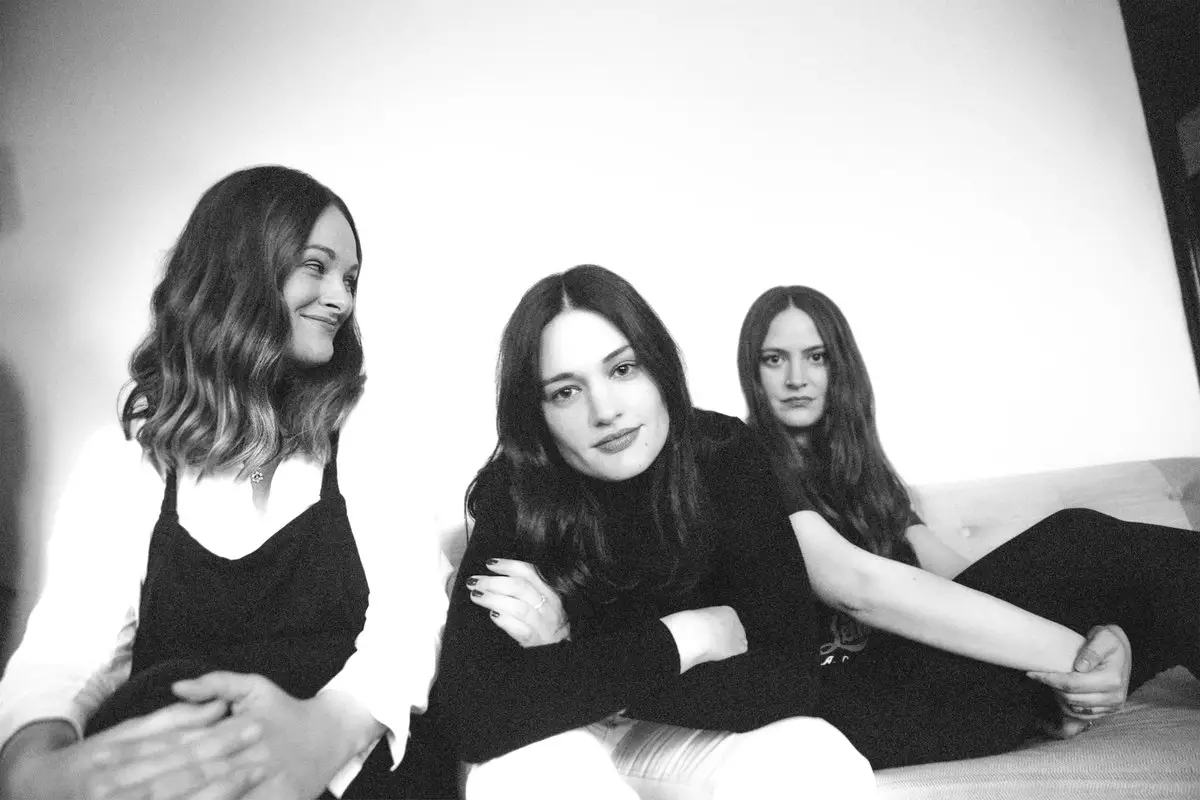
It sounds like you would be missing the nuance to say that the album is about grief and love, but it's more so about identity and kind of a new coming of age.
Camilla: Yeah. I think that’s a nice way of thinking about it. Kind of finding, I guess.
Yeah. You shared before in a BBC interview that “Sparks” was dedicated to your mother, and it brings so much more meaning to the lyrics, “Say you will be my little light in the dark, and I want to see you.” It's a really beautiful song and one of the most beautiful on the record. I'll just sort of say.
Jessica: Aw, thanks.
Camilla: Thank you.
Jessica: Thank you very much. Yeah, I think it was sort of kind of a stream of consciousness of lyrics, and they’re the vocals from the demo and it was… I was just sort of writing it as I went and singing them, and it just felt right and it didn’t feel like we needed to change it when we came to finally finishing the record. And yeah, I think it kinda just captures what was a kind of dream-like period of time, and I don’t mean that in the sort of the blissful sense of it, of a dream, like, the experience, but a feeling of nothing quite feeling real and everything was just kind of…
Those sort of thoughts that whirl around in your head when you go to bed, it’s something like that, I think in that song. And I’m glad you liked it. Thank you.
I feel like that song and “Trying” are two of the most classically Staves songs. They kind of remind us of your roots, of where you came from. We're not trying to add a lot of electronic, electric guitars, or anything like big to those songs, it's three sisters, making harmonies.
Jessica: Doing what we do.
But coming along from that a little bit, I know this record is a long time in the making. I was wondering if we could talk about a little bit of the other stories behind it and get a little bit more of Good Woman as an album, as a set of songs. For you, what do these songs represent?
Camilla: Well, it’s hard to… Because when we started making it, we didn’t have some idea of like, “These are gonna be the running themes” and “This is what we want this album to be about.” It’s kind of the themes of… Yeah, the themes have kind of shown themselves to be present as it’s gone on, as we’ve been making the songs. I think that something that seems to come up, again and again, is this kind of searching and trying, actually. “Trying,” we were gonna maybe make that the album title, but then as time went on, I think, Good Woman is just a bit better. But yeah, I think this kind of searching and trying to be a good person and searching for… I don’t know. I don’t know the right words for it. Help me out, Jess.
Jessica: I feel like The War on Drugs said it well, annoyingly, with their record, ‘A Deeper Understanding.’ I think that’s a really good title. I feel like that sums up a lot.
Camilla: Bastards.
Jessica: But it’s taken, so we can’t do anything.
Camilla: I think also being a woman and the roles that that entails, I think that kind of cropped up on various songs.
Jessica: Yeah, and I think obviously the album is called ‘Good Woman’ so there would be an idea that maybe all the songs are about that, or we’re kind of a sort of heavily feminist record or whatever. And it’s not kind of literally that, but inherently, we are women, and so these are our experiences that we’ve had, and it’s always gonna be put through that filter of, well, from our perspective, this… The same with whatever kind of identity you have. So it is kind of inherently about that, about those experiences from a female perspective, but it’s also just a lot of life things that have happened in, like we said, in the last three, four years of living. And when we started writing that album, some of the first songs that we started working on were “Good Woman,” “Satisfied,” “Trying,” “Next Year, Next Time,” and I don’t think we would have thought or could have imagined four years from that point where we’d be in our lives, that we would have lost our mom, Emily would have had a baby. So it’s definitely just captured a really… What’s ended up being a huge significant group of years. And all the kind of ups and downs, I suppose, that go on through that and all the different experiences, various crises.
It's tough. I don't think you ever intended to spend six years or so working on an album. You know the stories of bands who would put out multiple albums a year, back in the '60s and '70s. These days you do see a lot of artists take their time to create the record they want to make, but this one had its obstacles as well. And it sounds to me like whatever vision you may have had going into it five years ago, ended up changing a lot between then and now.
Camilla: Yeah, I think life has other plans for you, doesn’t it? [laughs]
Jessica: Yeah, but it’s made me think there’s, as Milly was saying earlier on, there’s not an infinite amount of time.
Camilla: There’s a finite amount of time.
Jessica: There’s only a finite amount of time. There’s a lot to be said for just getting on with things, and I think that we should put a new album out a lot sooner than in the next five years. That’s something that I think I would wanna take on, moving forward. Especially with what’s happened with the world and the world shutting down, and everyone’s careers being put on hold. It’s kind of like no one saw that one coming. So, I think there’s a lot to be said for just going for it. Striking the iron while it’s hot.
Were you working still on the album as of this time last year, before we went into the pandemic? Or had it been mastered by then?
Jessica: No. The album, I think at that point, was already mastered, so it was done. We’d just started doing some shows in the UK, so we’d been working with the band on getting the songs ready to play live. We were beginning our mission to get the album out, and then… Yeah.
One forgets that being with a major label means you have a 12-plus month-long marketing campaign.
Camilla: [laughs] Well, it was so frustrating, feeling like we’ve just come out of one hibernation, and like, “Yeah, we’re ready to show this new album to the world and to go out on the road and to play it to people,” and being really excited, and then being forced into another hibernation, it’s just like… I’m kind of over it now. [laughter]
Jessica: “We think we should postpone the album,” when it was like, “Okay,” and then there’s a new date suggested, and then it’s like, “We think we should postpone it further,” and it’s like, “Okay, is it ever gonna come out?” I think at this point, I feel really grateful that it is coming out, and I think that’s the best we can hope for right now. We can’t see into the future. I really hope one day we’ll be on a stage in a room full of people, playing songs from this record, maybe even from the next record by that point. And I believe that will happen, but as to when, I don’t know, so I think the best thing we can do right now is put it out. And I think people need music at the moment. I certainly do. So, I just really hope that it brightens up someone’s day while they’re stuck in their house or whatever it is they’re doing or having to go to a job as well, during this time, is also difficult. So, in a way, we’re offering a public service to people. [laughter]
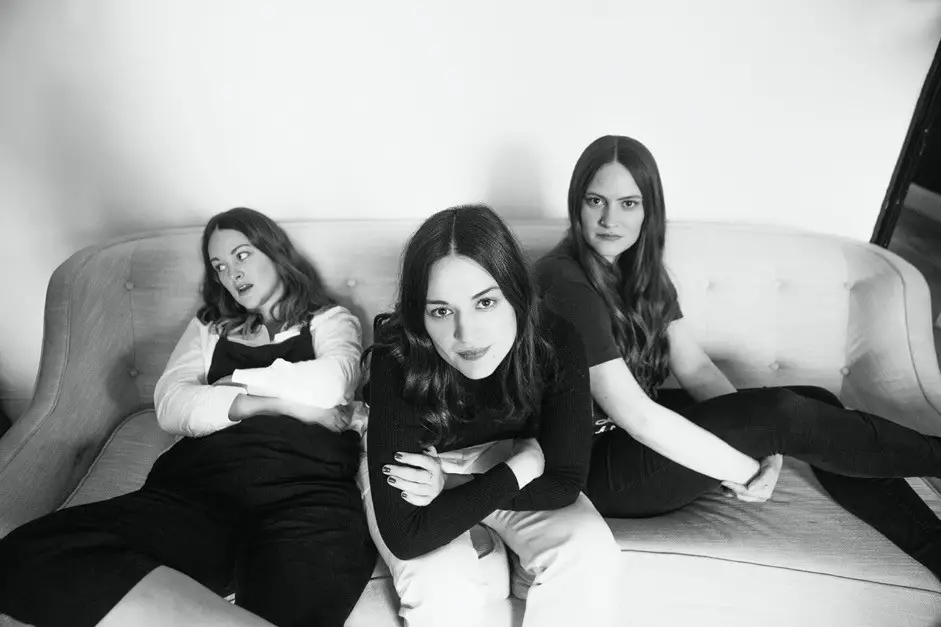
It really is. Shall we dive a little bit deeper into the music, then? I love the title Good Woman and, as you were already saying, I think there's a lot that ties into it that was apparent beforehand and also just makes sense for these songs. But as a record, how do you feel 'Good Woman' advances your artistry and tells us a little bit more about who the band are in 2021?
Camilla: I think that we’ve been, lyrically, the most upfront that we’ve ever been in this album. Again, I think, coming from that kind of slightly less tentative place and wanting and needing to just lay it out there a bit more. I guess that’s a pretty telling thing and a pretty tangible thing. And sonically, I think we’ve tried to channel that attitude as well and be bolder with our sound and with the sonic decisions, try and commit to them quite fully, even if that’s committing to having a really stripped-back song.
We’ve been, lyrically, the most upfront that we’ve ever been in this album
It works both ways.
Camilla: Yeah, yeah, I think that bold commitment… Yeah, it’s a hard one to answer, really, ’cause you never… It’s very hard to think about the thing you’ve made with any objectivity. I think almost other people would be able to answer that better than I could, ’cause they’d be able to see it and compare it with more objectivity than I could.
Well, it's interesting. Do you feel like you took any lessons from your experience working with yMusic?
Camilla: I think it was a great lesson in broadening the scope of songwriting, of not being beholden to traditional structure and things like that. That was really, really fun, to be working outside those parameters.
I thought that was fantastic. I think that for diehard Staves' fans, that goes down as a hidden treasure.
Jessica: Aw, thank you.
Camilla: I’m glad you liked it… It’s quite under the radar.
It is. And it doesn't get the attention that it deserves.
Camilla: Oh, thank you.
Jessica: Well, I also think… I think, by the time we were making that record, we had been using our voices, sort of, on stuff probably from the last record and stuff in between, and in shows and stuff we were doing, we were trying out different ways of using our voices. So using them more as instruments, as well as, obviously, singing lyrics and things in the normal way, but using them as an instrument, like a horn section or something. So I think blending in with a group of musicians was a really cool way of working and watching how they work together and the different ways that they harmonize and use the different instruments to emote, I suppose, we were just totally on that train at that point of working with them. So it was really what we were all into and using our voices in different ways.
And like you said, it was pretty wild writing that album. There were some songs that were quite straightforward, Staves songs, and then they worked with us in a more of just a traditional accompanying play. And then there were pieces that they’d given to us that we essentially re-mixed them, so we’d cut them up and changed the structure, and see if a melody could work over the top of what were some pretty far-out stuff. And there were some that didn’t work but the ones that made it to the record, they just came together in a pretty unique way. It’s quite hard to explain how it worked but it was… Yeah, it was really interesting. And also, with that record, I really enjoyed the fact that we recorded it all live, and that was something we hadn’t done in quite a long time so it was really nice to remember recording in that way and that it’s always something you can return to.
That's really interesting. Diving into some of these tracks... Personally, “Good Woman” has been one of my favorite songs in recent months. It’s a very special anthem, and it obviously holds a special place for you as well. Why open your album with this title song?
Jessica: Why not?
Camilla: Why bloody not? For one, I think it felt like quite a bold statement and also, I think, sonically, the beginning of it, sounds like a beginning to me. Like it’s… Yeah, I don’t know, it sounded like the beginning of the album and it was chronologically one of the first that we’d been working on.
Jessica: I think once we decided we were gonna call the record ‘Good Woman‘ as well, we felt that had to be the first song. It just made the perfect sense. But also, I’m just thinking like… The lyric in the first verse, it says, “My song is a song even buried in the black,” which I feel like also ties into the feeling of uncovering something. It’s like this is a discovery of something new, this song being the first song on the record.
Camilla: I think that by the end of the song, it’s quite defiant or I’m feeling quite defiant by the end of it, and I wanted that to be a starting off feeling, a jumping-off feeling for the record; this thing of questioning and trying to find out what it even fucking means to be a good woman and trying to cut through all the bullshit that either society or particular people, or partners feed to you about what you should be and what’s good enough. I think the idea of cutting through all of that and just taking ownership of what you think and what you feel is a strong start to something.
Camilla, you spoke with The Current's Jill Riley about the idea of the song being about questioning and when I hear “Good Woman,” I hear it as the answer. I like that it's a bold emphatic anthem, I like that it rises, I like that it's unapologetic and unashamed. I also like that it's a tribute to yourselves and your forebearers, your mother and your grandmother. It is special that it gets to be all those things.
Camilla: Yeah, it felt like it when it was made. As some songs do, it started to kind of inhabit different meanings or different areas of like, “Yeah, good woman, all the good women that have been in our lives, past and present, and future.”
Jessica: Especially the longer we lived with it, ’cause we ended up living with it for quite a long time. Yeah, definitely.
Camilla: Exactly.
I read a little bit about how you made the song in the BBC piece. Did you really place a microphone at one end of a room and shout from a distance?
Camilla: Yeah. Sometimes I think the idea of playing with different sonic space was something we really wanted to do from the offset and experimenting with being in different spaces and being different distances from the mic, and that brings out different performances as well when you’re not with headphones on right up against the mic. And yeah, I think that it was really fun for us to go to lots of different areas and do field recordings and layer those up, and really sing out. And, yeah. And especially at the end of that song, when the key kind of changes and I’m saying, “I’m a good woman!” It’s just like, I couldn’t be right next to a mic, I think I had to feel like I was alone in a room. Just shouting it.
It's so good – it sounds like you're almost about to blow the speaker out. I know this predates your producer John Congleton's involvements. Is any one member the person who's really into the recording and soundscaping, or do you all share that interest?
Jessica: I feel that that was probably led by Milly on this record. I think that was something that you were probably more into than the rest of us. Although we’re all into that kind of idea. I mean in the demo process for this record, there were songs that didn’t make it, but lots of those were quite heavily centered around using recordings… There was one that we did that was a song… We recorded a bunch of monks singing on the top of a mountain in Hong Kong when we were on tour, which sounds so cool and they’re singing in drones and it’s… I can’t remember what key it’s in, but there’s a key that they’re singing in, so we’re like, we need to write a song to that. And those kind of things were all really cool experiments, and thinking in this sort of what ended up feeding into this record. But just like being inspired by, I guess, just something different from what you usually would rather than just picking up the guitar and playing C and then G. Go and find a monk or…
Camilla: Go and find your local monk, you know.
Did the Monks... Did they specifically inspire any one of the songs on this record?
Jessica: Sadly the song didn’t make it on, it’s actually a really cool song. We so should have finished it.
Camilla: We should work on it, shouldn’t we though?
Jessica: But I think it’s just in my… On my laptop labeled as Monk shit. [laughs] Yeah, that song like it was that shit about monks, whatever… We’ll come back to it. But on Good Woman, there are some recordings of women’s voices actually, including our mom and our grandma and friends and family. And that falls in the second chorus of the song, and they’re mixed quite far back in the mix and they’re all playing at the same time. And we kind of felt like things like that, I felt represented the sort of inner chatter in one’s mind. Slightly kind of chaotic idea of worries kinda turning around in your mind when you’re trying to kind of focus and… Something like that anyway, almost just like, if you could kind of put a microphone in there and hear. So that… Yeah, that’s an example of those kind of different sonic spaces in the record and… Yeah, and then Mill is kind of screaming around at the end. And then also just being like…
Camilla: “Screaming around.”
Jessica: We were just like, you sound great. And it’s strange because I think sometimes you don’t use your voice in that way, or we certainly don’t. And I think as women, it’s often not desirable to sound unpleasant. We have quite sweet-sounding voices. When we’re singing harmonies, it’s a pleasing sound. So I thought it was really cool to just try and… For you to use your voice in a different way.
Camilla: I think also in terms of using lots of different voice memos and field recordings and things like that, and working from old GarageBand demos and things like that, you end up with a feeling of more of like a scrapbook, you know? You’re piecing together all these things that suddenly mean all these different moments to you, and it becomes, yeah, a bit of a patchwork.
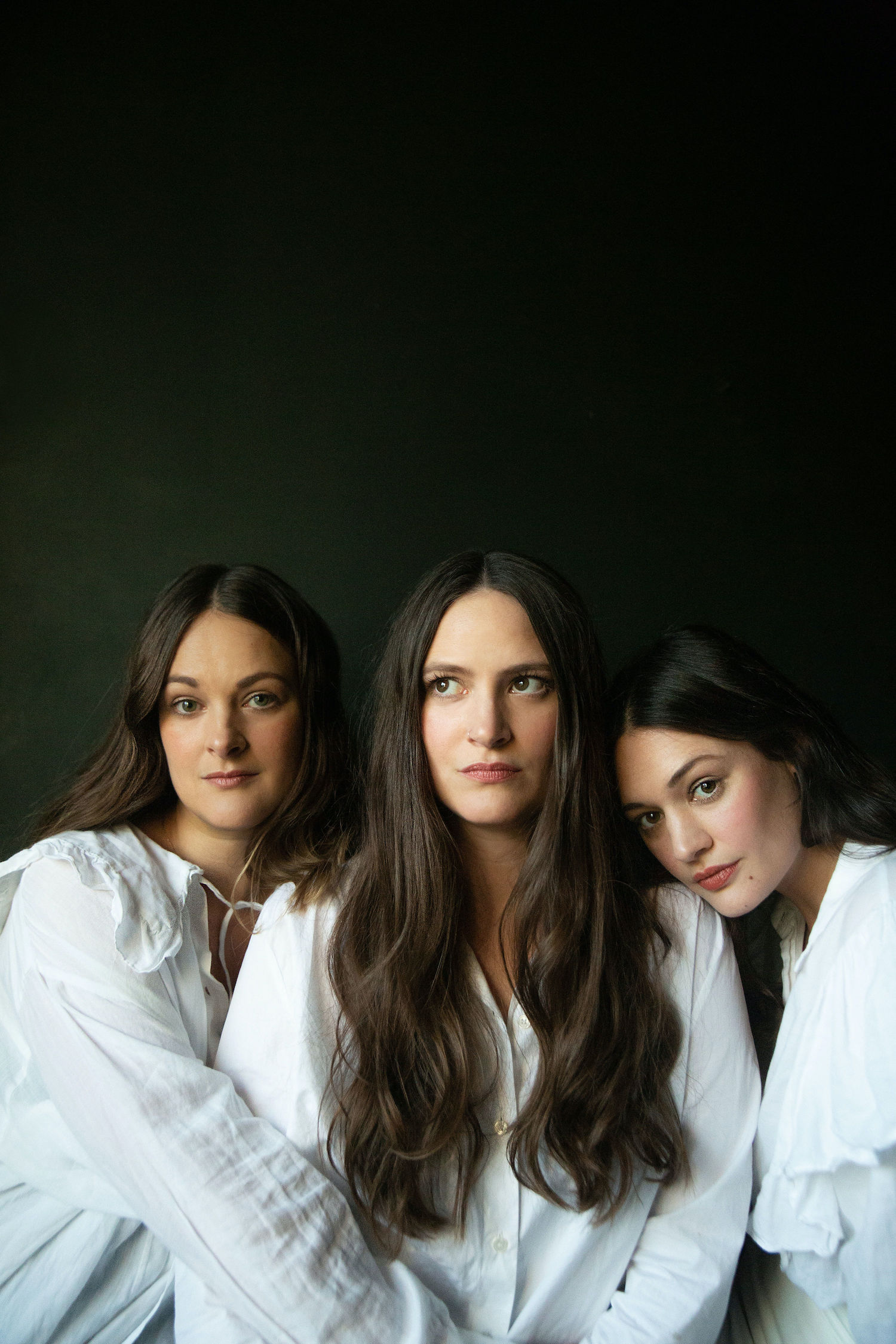
You talked about field recordings, I'm reminded a bit of another contemporary British band, Glass Animals. Dave Bayley, their frontman, always talks about taking little recordings of sounds if he ever finds himself inspired, and those always kind of end up being the patchwork blueprint for music. In your experience, Camilla, is it just touch and go and experimenting? Have you kind of learned from certain people in terms of what you're trying to achieve, or are you just kind of playing with it in real time?
Camilla: I think it’s just kind of playing as you go, really. It’s nice to… I’m a big fan of having contrasting things existing in one place, like a very far-off vocal, and then a very pleasant… A very kind of more present sound that sounds like it was recorded in the studio. There’s a… It’s on the album called “Paralysed” which kind of moves from one sonic space to the other. The first half is just… Is field recorder, and then it kind of transitions into this more full lush kind of studio recording. Traditional studio recording. Yeah, and I think I just get a bit of a kick out of that contrast really, and it’s really fun to play with, it’s… I’m not a… First and foremost I’m a singer rather than an instrumentalist. So I think that I maybe rely on those kind of things as stimulus a little more than sitting down jamming out on a guitar. I think those kind of sonic things are usually more starting points for me than the more tradish.
It's really interesting. Speaking of contrast, “Best Friend” kicks us into high gear with that driving drum set. I love the energy on that song, and the vocal harmonies are next level as well. How did “Best Friend” come about?
Jessica: The song came about… It was one of the later songs written for the record, and it was a piano idea, and I liked the idea of… I mean, the whole thing is just centered around one riff on the piano that just goes round and round. I like that kind of cyclical effect in music and there’s a sort of Steve Reich kind of inspiration, I think, in there where you kind of have a motif that just kind of goes around and then you kind of add sort of polyrhythms in with it, so there’s… It’s almost quite playful I think in that way. And then, so the intro is kind of like that, and it’s kind of some woodwind and stuff like that, and then the drumbeat comes in, and I kinda like that it’s slightly jarring, kind of “Oh okay” the sense of where the one is in the count, which I really love in songs where you sometimes feel like you don’t quite know where you are, and then the drum comes in and it’s like “Oh, okay.”
But the song, yeah it’s kind of one of the only sort of joyful songs on the record, ’cause it’s really nostalgic, and it’s 100% about my youth, and my best friends growing up and my home town and my high school. I think it’s that feeling of the rush of excitement of being young and how you’re so desperate to kind of grow up and get on with your life and be the sort of realized version of yourself, and you’re sort of hurtling towards this future, and it’s only when you get a bit older, that you look back and you think, ‘Why was I rushing? I was having a great time.’ It’s that sort of heightened sense of emotion and drama that you get at that age.
Camilla: An excitement.
Jessica: There’s nothing quite like it, so it’s quite nostalgic I think looking back and that feeling of everything being… Everything being possible, standing on the precipice of adulthood. And everything is just open possibilities at that point, so there’s something quite magical for me about that time when I think back to it. Yeah, I’m glad you liked the stuff.
It feels crazy. You released some of your first music 10 years ago in 2011, and how the hell we got to 10 years past so quickly, I don't know. But here we all are... You can't help but feel like you're in a new stage of your life. I like that song.
Jessica: Absolutely.
I think it's really cool to contrast that to the stuff that we hear in the Mexico EP. The vocals cascading upwards is a really good example of using your voices for something a little bit new and different.
Camilla: Oh, thank you.
Jessica: Yeah, somebody else said that song reminded them of the yMusic stuff.
Oh, cool.
Jessica: So there’s a touch of that in there.
Right. Well “Careful, Kid” is the hardest The Staves have rocked to date. I think that song is really cool as well, it's raw, it's full of overdrive, and just dramatic in all the right ways. How do you find you're managing to balance these bigger and deeper sounds alongside your signature vocal harmonies that still make The Staves, The Staves?
Jessica: I think that it’s really just our taste, like whatever suits our taste and feels… We think it sounds good then that’s kind of… That’s the answer really. So I think the… And I think that having a good mix engineer to mix things, make sure that… Harmonies are always really important to us to be heard and not to be drowned out, but it’s also pretty firmly established on any album of ours that we sing in harmony, so it’s okay to kind of allow that to take a back seat sometimes when there’s something that feels like it’s important to be heard instead. But yeah, I think it’s all just down to our own kind of sense of what we felt was right for the music, and it was really cool to be able to rock out on those songs, and “Careful, Kid” in particular, I remember in the studio, we had a demo going that had no drums on it, it was just kind of the structure of the song and with the crunchy riff that goes on throughout, and guitars and synths and it was really cool and we were like, it just needs… It needs drums, we need to see how that works. And I remember in the studio when we were recording with John, they just sounded so epic and so good, and he’s so great at getting amazing drum sounds and being really experimental with the way he records, and it was just like, “This is better than I ever dreamed it would be.” It’s really big. It’s fucking huge.
I'm remembering now, when we last spoke and when we last met in Brooklyn, you had just released the “Tired as Fuck” and “Train Tracks” single, and that was one of the first times you had really leaned into rock in your music beforehand. I mean, “Tired As Fuck” was just... It was an electric song. “The Staves go electric.” It's so exciting to see where you've gone with that since then, because I think at the time you were saying you were excited to try this out. And now to see where it's come to fruition and how it's manifested itself is pretty cool.
Camilla: Oh, thanks, I’m glad. It’s a forever fun thing to mess around with and seeing where we can take it.
Right. And you know, you always know like, the artists have their own interests in private, but how do they put it onto the record? And so it's fun to hear how it branched out.
Another song I really like on the album is “Next Year, Next Time.” I feel like it gives the perfect message of hope in COVID times. Has that been a present feeling for you as well, as you get closer to the release? And do you start to come back to these songs and say, “Wow, this means something a lot different than what it originally meant for me”?
Jessica: Definitely. I mean, that song was one of, if not the first song, I think that I’d written kind of in this sort of new chapter of thinking about a new record. And I think it was written in January, of whatever year, I can’t remember now. But it was kind of an idea of a kind of New Year’s resolution that sort of, you know, you’re sort of looking back at the year you’ve had and thinking about maybe grand plans that never came to fruition. And thinking, well, we’ll get around to it this next year, next time. But the song, it’s kind of a contradiction, because it’s sort of thinking about postponing things, but then the, I guess, anger you have towards yourself for like never actually following through on something.
And maybe almost reveling in the idea of, if something doesn’t happen, then it can’t go wrong. And it’s just a kind of dream. And so there’s kind of an excitement in that. So that must have been kind of where I was at or something, at that point. And, yeah, and now, It’s like, I think when we found out we were gonna put the album out, you know, a year after we planned it was like, well, “Next Year, Next Time” feels quite appropriate. And yeah, it’s really strange how some of the songs feel like the meaning for us even who have, you know written them, has changed and evolved over time, for sure. I mean, in lockdown, it’s like, there’s songs like, “Nothing’s Gonna Happen,” “Paralysed,” “Next Year, Next Time.” I mean, yeah, it does feel like there was perhaps a sense of foreboding on these songs that we hadn’t quite realized.
Camilla: Lockdown was our fault, basically.
Thanks so much. You mentioned “Nothing's Gonna Happen.” This is interesting because you released the demo two years ago. What are the major differences for you between the demo and studio version?
Jessica: Basically, we added some horns in the studio version. [laughs] There’s no… You know, it’s not a hugely grand reveal. But I think, just to be honest, but I think that we… When we released it as a demo, it was because, at that point, I think we still weren’t really sure about when this record was coming out. And we were getting frustrated that we had all these songs we’d already been living with for a long time. And we just felt we really wanted to put something out, I guess, to kind of say, like, “Hey, we’re still working on music.” And that was the only one that felt like it really worked. And we put out another song called “Nazareth” that was made during the same time as well. They worked perfectly as they were, whereas there were other songs, like the demo for “Good Woman” just wouldn’t have done the song justice to release it in an unfinished way. And when it came to the record, being, you know, finished and sequenced, we felt like it still had to go on it. It just felt like a real part of the whole story. And there’s a really beautiful horn arrangement on that by our friend, Marcus Hamley, who plays in our band as well. So I think, yeah, he played… He sent those parts through and it made me cry. And it kind of injected a new life into the song again for me… And sort of made me fall back in love with it again.
It's great to kind of have it reappear and it's funny, it ties in the journey a little more, because, as we've already been saying, six years is a long time. And a lot of life comes and goes during those six years.
Jessica: Yeah. And in the process of writing the album, we did feel, that we were missing a kind of acoustic guitar, three-part harmony, kind of song and so, that was deliberately written. I was like, “Okay, I’m gonna try and write a song like that.” Because things were naturally leaning in a different direction and we felt like we needed to pull things back and to, almost have a bit of a reset and unite together in singing. So yeah, it sits in the middle of the record for that reason. I feel like it’s a nice kind of core of the whole thing.
Yeah. It's the “No Me, No You, No More” of the album.
Jessica: Right. Yeah. I guess so. Whatever you want it to be.
Songs like “Paralysed,” “Devotion,” and “Satisfied” seem to really speak to the weight of love in and its special power over us. I know part of this record is a breakup record. Camilla, you've talked a little bit about that, but these aren’t “love” songs, per se. What would you call them?
Camilla: Stuck songs, being trapped songs. I think “Paralysed” and “Devotion,” those ones, for me, were written in a time, wildly, while I was still in a relationship, which is horrible now looking back on it and seeing the lyrics and just thinking, “Oh, my God. You should have got out of that way before.” But, yeah, I suppose those two, for me, when I was writing them were about, you’re so entrenched in something. Sometimes, it’s very hard to navigate your way out or know which way is up really. You just know you’re a little bit all over the shop and Jess, with “Satisfied” maybe, you’d be more placed to say about that.
Jessica: I think, that talking about whether a song is a love song or heartbreak song… Songs can definitely fall into those categories, but most of the time, when you’re writing a song, there’s not a plan of, “I’m gonna write about this.” There’s certainly not, for me. So I think they just… It’s literally just a way of expressing how you feel and sometimes you can’t express it by having a conversation with somebody. It’s like your feelings reveal themselves to you as you start writing a song. And that’s certainly how “Satisfied” was written.
Your feelings reveal themselves to you as you start writing a song.
“Nothing left to bring me anymore, and I know why, so high five,” you sing in “Failure.” I really resonate with that line. I was curious if the two of you have any favorite lyrics on this album?
Jessica: Well, I do like the lyrics to “Failure” actually, so thank you for putting that out. It kind of feels weird talking about songs you’ve written and being like, “I love these lyrics, I’m so good.”
Offer your condolences,
Your emotion and your promises,
I can hear you at the door,
You’re not there
You’re not anywhere
Acting like you know me,
Like you’re part of my family,
I don’t owe you anything
You just came in
And I’m sorry if I ruined the party
And I’m sorry if all the fuss really killed your vibe
So kind of you to think to remind me
When I got so low, but I really tried
Tell me how… tell me why
I’m a failure now
Nobody wants to play with me
Nothing left to say to me anymore
I’m a failure now
Nobody wants to sing with me
Nothing left to bring to me anymore
“Waiting on Me to Change” I really like, ’cause I think it’s putting on a slightly different hat, it’s a bit… I don’t know, not lounge singer, but there’s something a bit kind of jazzy or something about it, I don’t know, and I enjoy… I really enjoy singing that song, so that’s one that I like, and I think the lyrics to “Good Woman” are really good as well.
Camilla: Thanks, girl.
Jessica: So tell all your readers to go out and get tattoos with Good Woman song lyrics to that one, that would be great.
Camilla: I think, again, it’s awkward talking about your own songs, but in “Trying” I feel like one that… When I wrote it, I felt like it encapsulated exactly what I wanted to say was, “You can say I don’t know pain and so it don’t exist.” That was one that I felt like it said exactly what I needed to say about empathy and about people only registering that a thing exists if it’s directly happened to them, and being completely unable to empathize or put yourself in someone else’s position, and be unwilling to do that, I felt like I’ve said what I needed to say.
I’ll be here, trying
I’ll be here trying
I’m sorry, I’m sorry
You should be sorry, too…
Don’t close your eyes
Please step to this
You can say I don’t know pain and so it don’t exist
I’m in my room
And that’s all there is
That's cool that you brought that song up because the next line that I had in my notes was, “I'm sorry, you should be sorry too” from “Trying.” That's the other song, alongside “Sparks,” that I find an absolutely stunning, breathtakingly beautiful piece of music.
Camilla: Oh. Thank you.
Jessica: Thanks.
Yeah, you mentioned “Waiting on Me to Change.” It, a little bit, kind of feels like a call back to “Home Alone, Too” with a little bit of a different lyric, “I'll change when I want to...”
Jessica: Yeah, “Home Alone, Too” was written during the period of time in which we were making the record. So all those ideas came around during that period, so… Yeah. Well done for noticing that ’cause it’s…
Well, I love it.
Jessica: It’s a recycled lyric, you know?
Camilla: It’s a recycled lyric, we’re a very green band.
I thought that was awesome. “Oh my God, it’s a coda!”
Jessica: [laughs] I always think it’s nice if you can do that. If you can steal from your own lyrics, then it’s part of your own universe of where these songs exist.
Camilla: I was hearing that with other people as well, like other artists, when you hear like, “Oh, that was in that song and in that song,” and then it kind of like… There’s these little invisible threads between the songs.

You've got these Easter eggs that only your fans know about, and... I love this because it also speaks to this theme of change, and you intentionally made it the last song on the record, and it's a song that feels... It's a sad song, but it's like a song of springtime and new beginning, nonetheless. Can you talk to me about the choice to end the album with “Waiting on Me to Change”?
Jessica: Well, yeah. I think there’s also… To me, it’s kind of a related song to “Next Year, Next Time.” It’s that idea of trying to improve upon who you are but also maybe feeling like, I can’t be bothered, or why should I, aren’t I good enough as I am? Because sometimes if you say, you’re perfect as you are, don’t let anyone change you. Sometimes that’s not actually very useful because sometimes it’s good to change and to improve, grow up and learn new things.
Camilla: Or to critique yourself or something.
Jessica: So there’s an element in that song, I think, of being a little bit of a brat and kind of saying like, “I’m not gonna change when you want me to… I’m gonna do it when I want to… Even if I’m cutting off your nose to spite your face,” kind of thing.
Camilla: Yeah. Even though I know I should change, I’m not going to until I decide to. [laughs]
Jessica: Yeah, it’s like smoking. So knowing that you need to quit obviously, but then people telling you like, you should really quit, and it’s like, “I’m not gonna do it because you tell me to, I’m gonna do it when I want to.” It’s like that kind of fierce defensiveness, but I think having it as a closer, it just was a little out of character from the rest of the songs, and so it never quite fit sitting in between two of them. So it felt like a nice… It’s a kind of different sort of afterthought, I guess, after… I’m gonna forget the song that comes before that now.
“Trying.”
Jessica: “Trying,” in a way, is kind of like the drop mic, end of the record. And we thought that it might be the end, and then we were like, “How are we gonna fit that song in?” and that was a nice kind of echo afterwards of like, we’re still here and then the song fades out, and I kind of like the way that it’s almost like, you’re backing out of the room and leaving us still in there, kind of singing away.
Camilla: Yeah, it kind of drifts away, doesn’t it? Which feels like a good ending.
Now that we've gone through all these songs, I'm curious to hear from you, do you have any personal highlights or definitive favorite songs off the record, lyrics aside?
Camilla: I think “Best Friend” is one of my favorites, and so is “Careful, Kid.” And…
Jessica: I was literally gonna say, those same two as well.
They're so big.
Camilla: Yeah, I know. I like the title track as well. I enjoy singing it live, I enjoyed recording it, I enjoy listening to it.
They're the first three songs and they really are... You put your best selves forward there.
Camilla: They are quite large ones. It’s quite nice to… Especially with “Best Friend,” we’ve just never done a song that has that kind of driving thing and it feels exciting for us. Definitely.
Jessica: Yeah. I also don’t think there’s gonna be people out there who think you’re uncool for liking the first few songs of the record.
Camilla: That is so basic.
Jessica: Or maybe there are, yeah. You are such a basic bitch for liking track one of The Staves’ record. All the die-hard fans like track seven or whatever. But you never know, people are crazy, so you might get…
Camilla: It’s true.
I never say never. So, I have question about recording. I understand you produced this record with John Congleton. Do you feel like you had a totally different experience working with John as you did with Justin Vernon years back?
Jessica: Yeah, they were completely different…
Camilla: They were similar in the way of… It felt like… Like trying a lot of new things at the time with both of them, but I think while it was kind of a summer camp kind of playing around and finding new things on ‘If I Was’ I think on this last one, it was more like there’s a job to do and let’s do it really well and be quite pragmatic about it, and he worked really fast, John, which was exactly what we needed at the time. He has a lot of energy, a lot of conviction, and a lot of direction, and he’s very… He’s not an airy-fairy type of person, he’s very, very driven, and he knows what he wants, he knows… Yeah, he’s very sure of his opinions without being bullish, it was just a really great kind of driving energy to be around.
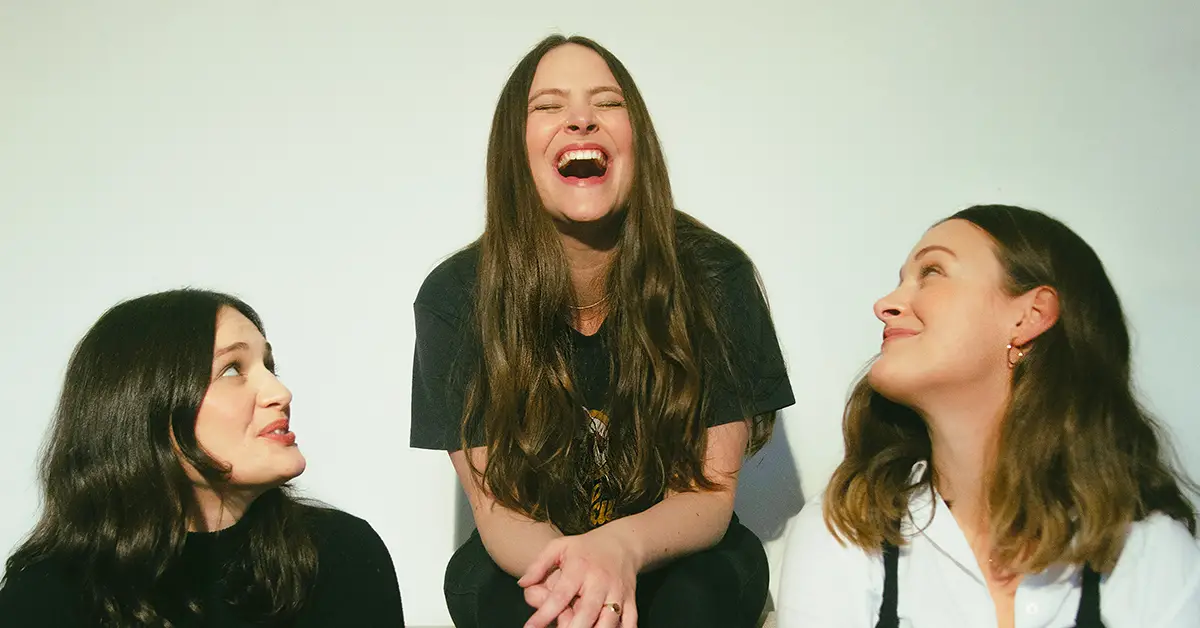
Awesome. So what do you feel you can take away and leave 2020-‘21, with having made this record? What do you feel you've taken out of creating this album?
Camilla: That’s a good question. I think a sense of confidence.
Jessica: I was gonna say the same thing. And kind of… Like we were talking about before, just going through what we’ve been through in our last few years of life, it feels like you can almost do anything, I guess. It’s like a strength. There was a point we never thought we’d finish this record and didn’t even want to at a point, and so the fact that we kind of got there, it makes me feel like we’re a lot stronger than I thought we were, and so, yeah, it’s confidence, like Milly said, and there’s a comfort in that, for sure.
That's amazing. What do you hope listeners take away from the record in contrast?
Camilla: Oh God, I don’t know. I think the same thing as I’ve always wanted, which is a sense of comfort or reassurance that other people are going through the same thing, maybe, that you are. Especially as we’ve been a bit more upfront and frank with these lyrics, I hope that it empowers people and I hope that it brings comfort to people – really, both those things. I know that’s very broad-sounding.
No, that's perfect and I think it fits the theme, it fits where all of us are right now in 2021. I’m also excited about your event on 5th February. Can you tell us a little bit about the preparations that were made in lead up to this big performance?
Jessica: Well, like we said, we’d done some shows with our band like a year ago to start beginning the touring process for Good Woman and it was just put on ice after that, so it’s been… The band have been sitting on ice, until now.
Camilla: It’s very visceral.
Jessica: We have a cryogenically frozen band, still with their instruments, but I think it’s just been so nice to get back in a room to rehearse and to remember all the songs, and I think they always breathe a new lease of life when you actually play something live, and that’s the fun thing about touring. The songs feel different every night in front of a different crowd, and already we’ve had this record kind of sitting, waiting to be heard for a year, so it’s been really exciting to revisit the songs again for us and… Yeah, and obviously, sadly, we’re not gonna have an audience in the room, which is, let’s be honest, really weird and not ideal for anybody, but that being what it is and everyone understanding that it’s gonna be so nice to think that there will be people especially around the world, actually watching us play and hopefully sending messages and stuff like that, and all you can do is give a Like instead of clap your hands, but it’s gonna mean so, so much to us, and I just really hope people enjoy it, and I think it’s pretty cool. You can watch it in your pajamas at home, not have to have your feet like trodden on at a show, beer spilled down your leg, or whatever.
That is so exciting, and it'll certainly be a nice change of scenery out of, you know, what we've been talking about every day feeling the same, so. Just to conclude, Good Woman is about to be out in the world. It's been a long, long journey and that can't be understated enough. So how are you feeling about having this release finally come to fruition? Do any words or emotions come to mind?
Camilla: I think just closure, relief really.
Jessica: Yeah, not to sound too negative, a release, in the sense of releasing an album is also for us a kind of release to be kind of set free in a way, and that’s not to say that this album has been a torment, but it’s been a big part of our life, and it’s gonna be really nice to let it go and let it belong to other people.
Well thank you both, and it's been nice to reconnect. Like I said, this feels like it’s a long time coming. I appreciate how much you shared and congratulations: I hear how much this means, and I so look forward to seeing Good Woman out in the world.
— —
:: stream/purchase Good Woman here ::
Stream: “Devotion” – The Staves
— — — —

Connect to The Staves on
Facebook, Twitter, Instagram
Discover new music on Atwood Magazine
? © Sequoia Ziff
:: Stream The Staves ::

